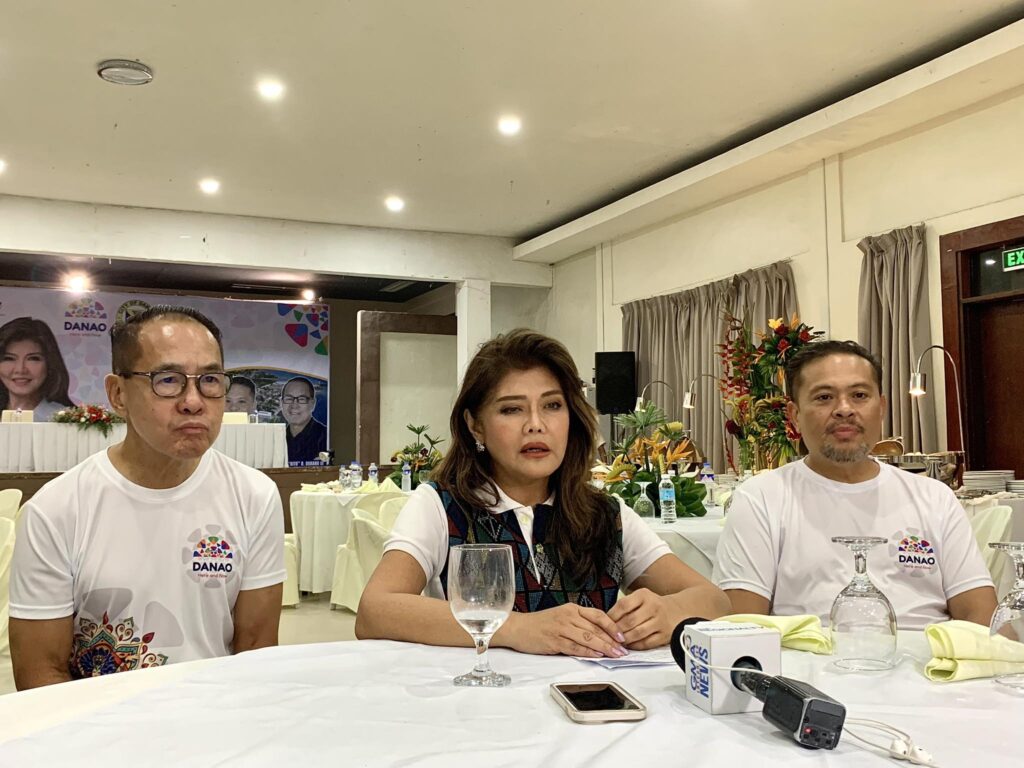
Senator Imee Marcos (center) talks with Cebu media on Sunday, September 17, 2023 during the celebration of Karansa Festival in Danao City. With her are Danao City Vice Mayor Ramon Durano III (left), and Danao City Mayor Thomas Mark Durano. | Niña Mae Oliverio
CEBU CITY, Philippines — In connection with the recent price ceiling on rice, Senator Imee Marcos believes it would be better to buy rice from local farmers for now.
Effective by September 5, 2023, the Executive Order (EO) 39 of President “Bongbong” Ferdinand Marcos Jr. mandated the new price ceiling at P41 per kilo for regular-milled rice and P45 per kilo for well-milled rice.
With this, Senator Marcos said the new price ceiling on rice “attempts to address indirectly which should be addressed directly.”
READ: Imposing price cap helps stabilize rice prices — lawmakers
Buy local rice
It is an attempt to sort out the prices but she believes it would be more direct for the National Food Authority (NFA) to buy local rice.
“Simutin muna lahat ng available rice. There’s rice in Bukidnon, there’s rice in South Cotabato, there’s rice all over Luzon in Nueva Ecija, Isabela, even in Ilocos Norte selling at P25 per kilo,” she said.
(Buy first all the available rice. There’s rice in Bukidnon, there’s rice in South Cotabato, there’s rice all over Luzon in Nueva Ecija, Isabela, even in Ilocos Norte selling at P25 per kilo.)
She told reporters on Sunday, September 17, in Danao City that the NFA should buy those rice first before thinking of importing as a solution.
“We’ve recommend that NFA that still has approximately seventy-five percent of its budget still intact. Bilhin nila muna lahat (They should buy all of those first) and help in the shipping and transport and distribution cost so that we can bring it down,” she said.
Senator Imee Marcos said that imported rice was very expensive like Vietnam rice.
“Sadly, Cebu falls prey to all kinds of manipulation and shortages simply because there’s not much rice in Cebu, so whatever is imported or whatever is brought in is subject to all sorts of price manipulation,” she said.
The senator said it would be very important to handle the situation.
READ: Double-edged sword: The costs of controlling rice prices
Local farmers first
“For me, unahin muna yung local farmer bago magimport,” she said.
(For me, You put the local farmers first before we import.)
Moreover, she thinks that it is too late for rice importation now because the harvest season for rice is at the end of September.
The full crop will be coming in October.
“They should have imported (rice) early for July and August. Year on year, that’s what we used to do. You project when the shortages will occur, they normally occur during the lean month. It’s June, July, August is very bad, and then the beginning of September but the early harvest start coming out by the third week of September,” she said.
Moreover, she said that if the government would import rice right now, the price of local rice would become much lower and it would affect the local farmers.
READ: Biz group urges lifting of rice price cap after 2 to 3 weeks
Late importation
Senator Imee Marcos compared it with what happened to the onions last year, saying that the importation was late.
“That’s what happened also with sugar when the milling started and the imported sugar started coming in, and a lot of local sugar stood without very profitable sales,” she said.
Short term is to buy the local rice, according to her.
And the medium term is to start subsidizing transport because it is very expensive.
The senator said that the challenge is to feed Metro Manila and Metro Cebu by bringing all the rice and basic commodities to these two huge areas.
She also mentioned the Kadiwa and the Food Terminal Incorporated (FTI) founded by the late President Ferdinand Marcos Sr.
“The FTI is the bagsakan. Para siyang bagsakan ng lahat ng rice and other products from the north and south. ((The FTI is where we deliver the goods. The place will be like the place to deliver all rice and other products from the north and south.) And then they were attempting to start also here with the bridges in Cebu, and then it will be distributed in Kadiwa trucks to all the markets so that the prices are down,” she said.
READ: How does inflation impact local traders?
Agricultural investment
She also suggested putting up a similar distribution system in the medium term or in the long term without shortcuts to agricultural investment.
Among the agricultural investments that she recommended is on the irrigation system.
“Kung tutuusin, it’s inexplicable the Philippines has become number one in rice importation kasi yung kulang natin is 10 to 15 percent lang. In the old days, my dad would say kung may kulang, kalahati lang ang i-import. Baka mahabol pa yung isang kalahati, hindi naman kakainin ng sabay-sabay ‘yan,” she said.
(The way you look at it, it’s inexplicable that the Philippines has become the number one in rice importation because what we lacked is only 10 to 15 percent. In the old days, my dad would say if there is lack, only one half should be imported. Perhaps, we can still reach the other half. Anyway, these will not be eaten all at once.)
On the other hand, she also acknowledged that importation was profitable to some traders.
The senator visited Danao City on Sunday to lead the distribution of the financial assistance to individuals in crisis in the city.
Afterwards, she also took some time to watch the city’s Karansa Festival ritual showdown were she served as a guest of honor.

